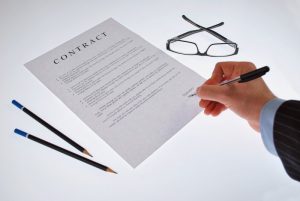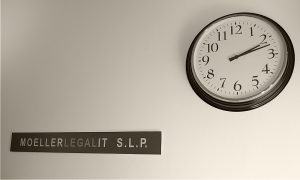Legal advice
Legal advice for homebuyers in Spain
The purchase and sale of real estate is one of the main operations carried out within the branch of real estate law. This legal business involves many details that can cost an individual to understand without a corresponding advice from a professional. In a sale you have to pay close attention to a large number of aspects related to the property itself (licenses, qualities, charges and easements, legal status, cadastral rating, etc.) and other parts of the negotiation (bank loans, the Mortgage, the payment of taxes, etc.) to avoid future problems.
An appointment for a legal consultation with an English speaking lawyer, even if you have not yet purchased your property on the Costa del Sol, is unavoidable, as it may be possible due to your personal and economic situation, even before you buy or in the future taxes save. You may also have to conduct sales negotiations when you are back in your home country, and it is clearly more difficult to find a good lawyer remotely than in the field directly.
Professional lawyers will help you gather all the necessary information.
They are in charge of the legal aspect of real estate investment both in Spain.
They also have a department that is dedicated to the sale and management of various real estate.
Lawyer will charge you according to the service you require. This will vary according to the complexity of the purchase. Many charge around 1% of the purchase price in legal fees.
Of course we offer the possibility of a first free consultation by an English speaking lawyer.
The procedure when buying a house in Spain
The individual steps when buying
Deposit and Reservation contract
Once you have taken the decision of buying a determinate property, the first you will be asked for is to pay an initial deposit to keep the property out of the market. This amount could vary between 3.000 and 6.000 euros. The aim of the deposit is to take out of the market and booked exclusively for you while you are studying the legal situation of the property and other matters, like mortgages, financial status, etc.
During the validity of the deposit contract, if the Vendor does not fulfill his obligation and he breaches the contract with “bad faith” (refusing to sale or changing his mind, or selling to another buyer), then he will refund you the double of the mounts received as a penalty for breaching of contract. In instance, if the Buyer fails to complete the sale, he loses the amount of his deposit.
The Purchase contract (“Contrato de Compraventa”).
Once the deposit is paid, and you have made the searches on the property, in the majority of the cases it is established to arrange a definitive contract in which an additional partial payment is required.
This contract is now a definitive one. The main difference with this one and the reservation or deposit contract is regarding the obligations of the parts. Mainly, the obligations of the vendors are higher because, with this contract, the vendor cannot pull out the sale, or sale to a third part. The intention from the vendor to sale to the buyer is now confirmed, and he, simply, cannot leave the sale.
In the purchase/sale contract is included all the terms and conditions for the purchase, and the sale of the property, fixing the price, and considering the circumstances obtained after the searches over the property. For example, it can be agreed that the vendor has to fulfill determinate obligations, like to update the size of the property in the land registry or to pay determinate bills which were unpaid so far; etc.
Also, in this contract the expenses to pay by each parts are detailed and listed, like who pays the notary and land registry fees, etc. Is highly recommendable that this contract is made by Solicitors with experience in Conveyance.
Completion of the sale – Title Deeds or (“Escritura de Compra venta”).
The “Contrato de Compraventa” is a private contract confirming a valid sale of the property to the buyer. This contract is perfectly valid between both parts with the rights and obligations contained. But, to complete the change of the names in the ownership of the property is not enough. This is done passing the agreement from a “private” contract into a “public” one. The “public contract” is called “Escritura de pública de compraventa” or “Public Tittle deeds”.
The “public tittle deeds” in Spain are not done by private Solicitors, like other countries as UK. They are done by Public Notaries. So, in Spain, to run a contract from “private” into “public”, it must be notarized (Certified by a notary), and inscribed in the Property Register, when it becomes an “escritura publica”. And this is the most important moment of the sale, because use to make coincidence with the last payment of the price to the vendor, and is the moment in which the vendor gives the possession and the ownership to the buyer.
Normally the Solicitors of the parties will provide the necessary details and wording of the agreed clauses to the Notary, and on an agreed date both parts (vendors and buyers), in person, or by legal representatives (power of attorney), must be present at the notary office at the day of completion agreed in the previous private contract. If the buyer requires a mortgage to buy the property, the mortgage bank representative must also attend the meeting in order to complete the mortgage loan to the buyer. As mentioned, if buyer or vendor cannot attend this meeting, they can arrange a “Poder” (power of attorney) to allow someone else to represent him (usually, Solicitors).
How to make the payments
As explained above, the best way to make the final payments of the sale to the vendor is directly from a bank account on your name in Spain. For this, previously you had to open a bank account on one of the Spanish banks. Before completion, you need to transfer from your country of residence, the necessary amounts to your Spanish bank account in order to cover:
– The rest of the final price to the vendor
– The expenses and taxes of the transaction (notary and land registry fees, taxes, legal fees, etc.).
The most common practice to make the final payment of the price to the vendor is by a Bankers Draft issued in the name of the vendor. So, make sure that you, or your Solicitor (should you have agreed to route the payment through the Solicitor’s client account, specially when he will act with the power of attorney), have enough provision of funds in the Spanish bank account to attend this payment at least one week before the day agreed in the Notary.
The other expenses, such as the Transfer Tax, Notary and Land Registry fees, etc., can be agreed separately, and paid to your Lawyer, or to your mortgage bank, if is the case.
Please bear in mind that if the Vendor is non-resident, you have to retain a determinate amount of the price to pay to the vendor (the 3%), and deposit it to the Spanish Tax office (called “Hacienda”) on account of the vendor’s capital gains tax liability. This is done using the model 211. Your Solicitor will instruct you how to proceed with this point and will guide you through the complex regulations of the fiscal retentions.
Purchase Costs and Expenses
You need to reckon that in total your costs of buying the property will be around 11-12% of the purchase price but not Always are not related to the value of the property and so could vary widely.
The tax to pay for purchase of a RESALE is not VAT (IVA), which is currently is the 10 %, is a different tax called Transfer Tax, or Impuesto sobre Transmisiones Patrimoniales (ITP), which is now the is 8% (in the majority of the Spanish regions) of the purchase price.
If you purchase a new property from a Developer you pay VAT (IVA) at 10% (instead of the 8 % ITP) because the sale is a business transaction, between a company (the builder), and a costumer (the buyer). But, in resales, there is not a company involved, is only a private transaction between two individuals or particulars.
Your lawyer’s fees, which are likely to be around 1% of the purchase price, plus VAT. In addition to this, your Solicitor will charge you for the expenses of the searches like land registry reports, certificates, costs for changing utility contracts, and other administrative charges.
Other expenses to pay on resales are notary, registration and handling (gestoría) fees, which may be around 0.5-1 % of the purchase price.
If you needed a mortgage, there would be also notary and registry fees to pay for registering the mortgage deed, together with commissions from your bank and other charges like life, or house, insurance, etc. There would also be a valuation fee, which is the surveyor contracted by your bank to evaluate the property.
Expenses to be paid by the Buyer
•Notary Fees: For the formalization of the title deeds
•Land Registry Fees: For the inscription of the property deeds in your name in the official Registro de la Propiedad.
•Transfer Tax: (ITP) Currently, this is the 6% – 8%-10 % (depending on the areas) over the total price of the property.
•Others: Solicitor Fees, Mortgage expenses, contracts of water, electric, and gas, etc.
Obtaining a NIE (Foreigner’s Identification Number)
The Foreigners’ Identification Number (NIE) is a personal, fixed and unique number that is used to identify foreign taxable subjects who, logically, do not have the tax identification document that all Spanish people have. All foreigners with economic, professional or social interests in Spain are under obligation to apply for a NIE before the relevant body of the Spanish Ministerio del Interior (Home Office).
The NIE must figure on all public documents that the interested party signs or which are issued in Spain, so the client must have this number before signing the deed of purchase.
You can get that at the Spanish Consulate or Embassy in your country or at the Police Station of the Spanish town where you live, work or intend to buy. The problem when doing it yourself is normally the time that it takes, the queues you have to do, etc.
We offer a fast and efficient service to obtain the NIE.
Opening a bank account in Spain
To buy a property in Spain, you must open a bank account
You will need a bank account in Spain to pay the utilities invoices and the fees of the Community of Property Owners. In the case that you obtain finance to buy the property, you will also need a bank account for the mortgage monthly repayments. You can use any bank in Spain but it is advisable to open the account with a bank and branch close to your place. Before opening an account it is important to be informed of the service charges for depositing funds, receiving or sending transfers, clearing cheques, etc. as we know from experience that there are huge differences between banks.
Here are the necessary data for the account opening:
- Passport
- Last income tax declaration
- The British tax code
- Document proving the address in the residential land. If it is correct in the tax return, it is enough, if not, a receipt (light, water, mobile phone) is enough.
Registration at the registration office (Padrón)
Registering at the registration office (the Padrón municipal de habitantes), is essential if you wish to import a car to Spain or use Spanish public services like education or the Spanish healthcare system. The Padron is a list of all the people that live in a property, in a town, or in an area, and it helps the national and regional government authorities responsible for fiscal services and spending, decides how much money to give to each council. Registration on the Padron is a mandatory legal requirement for people living in Spain, and it does not matter whether you rent a property in Spain or you own your own home in Spain.
Residence received
If you are planning to live permanently in Spain, it makes sense to apply for residency. Not only will your presence in the country be legal, but you will also be entitled to almost exactly the same rights as a Spanish-born citizen. The tarjeta de residencia (residency card can be technically difficult to obtain if you are not familiar with Spanish administrative procedures, or if you don´t speak fluent Spanish, and we highly recommend that you seek the services of an experienced specialist. Our customer services team can assist you with your application for residency in Spain, just contact us for more details.
Building Permits in Spain
Once you are settled in Spain, you might decide to make some improvements to your property in Spain. Regulations regarding what you may and may not do are complicated, vary from area to area, and require separate applications for both planning permission and a building license in Spain. The Spanish authorities regularly target illegal builds, unsafe building modifications, and building improvements made without the necessary permissions in place. If you are contemplating making physical amendments to your property in Spain, please contact us for assistance before you proceed.
The land register
The land registry in Spain, an important public office for all home owners, in Spanish “el registro de propiedad“. The land registry office is managed by the “registrador”, a legal professional that has to make sure all documents authorized by the Spanish notaries are legal and then register them in his books.
Only deeds completely legal can be registered, if a deed is not completely legal changes will have to be made before registering it in the land registry.
 A land registry office you find in larger towns and cities all over Spain, the bigger cities have more then one land registry office. Each land registry office is responsible for a certain area and has to managed the registry of all properties in that area.
A land registry office you find in larger towns and cities all over Spain, the bigger cities have more then one land registry office. Each land registry office is responsible for a certain area and has to managed the registry of all properties in that area.
The land registry can provide you details of a property like ownership situation, debts and encumbrances and property details like square meters. The document containing all these details about the property is called “nota simple”. Deeds of purchase of property and land but also mortgage deeds and mortgage cancellation deeds are registered in the land registry office.
When you buy a property your solicitor arranges the registration in the land registry of your property, this comes with his conveyances service. Do you wish to check the registration situation of your property, please let us know, we can help you with that.
Certificate of habitation ( Licencia de Primera Ocupacion )
A new property is issued with the ( Licencia de Primera Ocupacion or Cédula de habitabilidad ) certificate of habitation. This is the certificate that means that the property complies with the town hall’s habitation requirements. Resale homes should also have one of these.The certificate of habitation is an important document for purchasers of a resale property to make sure they have. It is the responsibility of the seller to pass on a current cédula de habitabilidad to the purchaser. The cédula de habitabilidad is valid for ten years, after this period it will need to be renewed in case of sale.
Owner Community
The vast majority of properties in Spain are part of a community of property owners. The community of property owners is a legal person jointly made up of all the property owners of a building or residential complex. It is governed by a set of rules and it makes decisions on matters of general interest to the property owners: maintenance, repairs and improvement works on the common areas (entrances, gardens, swimming pools, etc.), outsourcing services (security, cleaning) and relations with other communities of property owners and local public agencies.
Each property is assigned a share coefficient, which corresponds to the property’s total surface area as a percentage of the building or residential complex’s total surface area. Each owner will contribute to the common expenses with an amount proportional to their share coefficient.
The community of property owners must hold at least one annual general meeting, although additional extraordinary meetings may be called if necessary. The annual general meeting is the time to present the income and expenses balance sheet for the year, approve the budget for the following year and vote on the community’s representative positions. Any other matters of general interest to the community can also be discussed if any of the owners explicitly requests so.
The community fees will largely depend on the size of the residential complex, the services and facilities available and the number of property owners. Many communities apply discounts for prompt payment and surcharges for late payment, so it is recommended to pay community fees by direct debit.
The following additional costs must be considered when
buying property in Spain
Property tax ((I.B.I.)
A local tax on the ownership of property in Spain, irrespective of whether the owner is a resident or not. Calculated on the basis of the valor catastral (an administrative value that is usually lower than the market value, sometimes considerably so) set by the town hall the tax rate goes from 0.4% – 1.1% of the valor catastral depending on the Spanish region.
Lawyers’ fees
Will charge you according to the service you require. This will vary according to the complexity of the purchase. Many charge around 1% of the purchase price in legal fees.
Land Registry Inscription Fees
Expenses related to inscribing the sale with the land registry are also nearly always paid by the buyer, and are calculated in relation to the purchase price declared in the deeds of sale. To be on the safe side you should calculate 1% to 1,5% of the purchase price declared in the deeds, though once again it depends upon the property and the area, and the fee could be considerably lower.
Land Registry fees
The costs associated with registering the sale in the land register are also almost always borne by the buyer and calculated in proportion to the purchase price stated in the purchase deeds. In order to be on the safe side, you should calculate 1% to 1.5% of the purchase price stated in the certificate, this also depends on the property and the area and the fee could be considerably lower.
VAT & Stamp Duty (IVA & Actos Jurídicos Documentados – AJD)
These taxes apply for residential properties being sold for the first time (never previously occupied), or for commercial properties and plots of land. This is a national tax, so VAT is the same wherever the property is located (with the exception of the Canaries, which have their own version of VAT).
At present VAT (known as IVA in Spain) is 10% on the purchase price of residential properties (villa, apartment, etc.), and 21% for commercial properties and plots of land.
VAT on new homes in the Canaries is known as IGIC (Impuesto General Indirecto Canario), and currently stands at 4.5%
Spanish Transfer Tax (Impuesto sobre Transmisiones Patrimoniales – ITP)
This tax applies if the property is deemed to be a second or posterior transfer (i.e. not the first time a newly built home is bought), and is paid by the buyer. If any deposit is paid before completion of the sale it is not subject to ITP pro rata. However the full amount of ITP still has to be paid upon completion. In this scenario there is no VAT to pay, and stamp duty is already included in this tax.
The Transfer Tax rate is ceded to the autonomous regions, which can choose to apply the general rate, or their own rate.
The general (national) rule of ITP is 7%, but many of the autonomous regions have applied higher local rates. The rate you pay depends upon the autonomous region where you buy (for more information see Transfer tax on resale homes – Impuesto de Transmisiones Patrimoniales (ITP)
Estate agency Fees
Estate agency fees or commissions are paid by the seller, unless otherwise agreed. If the buyer uses a search agency then search fees are paid by the buyer.
Despite the ability of the internet to bring together buyers and sellers without the need for an agent most people still use agents to find property in Spain. However you should be aware that agents charge between 3% and 5% of the sale price, depending upon the region and type of property. Unless the buyer has specifically agreed to pay the agent’s fee this cost will be built into the sale price.
Annual taxes for foreign homeowners
Non-Resident Income Tax
Non-resident natural persons in Spain who are owners of urban real estate located in Spanish territory are subject to the annual payment of the Non-Resident Income Tax. The yield obtained from the property, whether it is real yield (rents) or estimated (own use) is subject to tax.
-
Rental
The tax rate applicable to the income obtained from the rental of urban real estate is currently 19% for citizens residing in member countries of the European Union, as well as those residing in Iceland and Norway. The tax rate rises to 24% for citizens residing in any other country.
In cases where there is a double taxation agreement with Spain, the owner of the property may deduct the amounts paid for this concept in the income statement that he presents in his country of tax residence.
The declaration of the income derived from the rental must be presented at the end of each quarter.
-
Own use
If the house is intended for own use or is empty, the applicable rate is also 19% for citizens residing in member countries of the European Union, as well as those residing in Iceland and Norway. The tax rate rises, in the same way, to 24% for citizens residing in any other country. The tax base will be 1.1% of the property’s cadastral value, if said value has been revised or modified after January 1, 1994, and 2% of the cadastral value in all other cases. Likewise, a proportional calculation will be made based on the number of days of the year in which the property has been owned.
The deadline for filing and entering the income tax in the case of properties intended for own use will be between January 1 and December 31 of the year after accrual.
The Non-Resident Income Tax must be paid through self-assessment, that is, the taxpayer (or the representative designated by him) is obliged to personally carry out the calculation, fill in and validate the corresponding form over the Internet and manage the payment. The Spanish Public Treasury does not send non-resident taxpayers any communication, payment notice or settlement related to this tax.
Finally, it should be mentioned that, as a result of the recent measures introduced by the Spanish Government for the prevention of tax fraud, the Tax Agency has started a campaign to warn property owners who have not submitted a declaration for this concept of the need to regularize your tax situation in order to avoid significant financial penalties.
The contracts at a glance
The purchase option agreement
With this contract you pay an agreed amount to the vendor – say 10%, of the agreed price – and in return the vendor commits to sell you the property at the agreed price if you exercise the option to buy within the timeframe agreed. If you exercise the option to buy then the contract becomes, in effect, a fully binding private contract of sale, and your payment counts towards the full price.
However if you don’t exercise the option in the agreed timeframe, then you lose the money you have paid for the option, and the vendor is no longer contractually obliged to sell you the property. That would be the end of the matter and you would have no grounds to dispute the contract in court. For this reason this contract is popular with vendors. However you should only sign this contract and pay the option amount if you are sure that you want to proceed. You need to do a full due diligence before proceeding to sign this type of contract.
The down payment contract
This contract requires that you pay a deposit – normally 10% of the agreed price – when the contract is signed. If you fail to go through with the purchase having signed the deposit contract you will lose all of your deposit to the vendor. However if the vendor backs out before signing the deeds then the vendor will have to pay you back double the deposit. Therefore this contract makes it expensive for either side to back out, but at the same time it does leave the door ajar should either side wish to do so. Unlike the contracts discussed below you cannot be forced to go through with the sale, though you lose your deposit if you don’t.
You should only sign a deposit contract once you have done the necessary due diligence and been given the all clear from your lawyer, as you may lose the entire deposit if any problems subsequently emerge. Spaniards often use the deposit contract when buying property, unlike the reserve contract, which the Spanish have never typically used. This is the contract you are most likely to be asked to sign.
Construction contract
Housing construction requires an important specialization and you have to be sure that you hire good professionals, such as an architect who drafts a project with the plans of the work and that during construction controls the works of the builder.
To order a construction contractor or contractor, the construction and construction of a new housing project, you have to sign this contract to carry out the work, think you need to ensure your interests and know that the builder complies with all guarantees and insurance.
With this contract you will agree on the price, the payment method, the date of delivery of the work and the penalties for delay, since it is a very important topic for your business. It is important that you know, that any delay in the delivery of the houses, is going to hurt you because you will not be able to deliver them in the term that you have agreed with the buyers of the houses.
Without a public end of work and habitability certificate (cedula de habitabilidad) no contract can be concluded with suppliers of electricity, gas and water.
The Notary contract
The Spanish land register lists properties, their characteristics, ownership, charges and other notes. Only the registered owner can transfer or sell the property. This can be done in person or by notarial power of attorney.
To obtain changes in the land register, a notarial act must be carried out. The notarial purchase contract contains primarily:
The contracting parties and also authorized representatives
The contract object, ie the property
The purchase price and the terms of payment
Any charges
Other notes
The notary checks before each sale by means of Land Registry excerpt the ownership and charges and other notes.
After the notarial procedure, the so-called “Priority notice” (asiento) are entered. Upon registration of the reservation, a period of 60 days will commence to pay all taxes in order to obtain final registration with the Land Registry.
With the reservation, the buyer ensures that no third party can make further entries in the land register.
Reduction of Inheritance Tax for Non-EU residents
The Supreme Court, through several sentences issued during year 2018, has taken another step further as it has recognized the application of these regional regulations on the Inheritance and Donation Tax to any citizen regardless of whether they reside within or outside the EU or the EEA.
Therefore, the Tax Agency has had to change the criteria of interpretation and application of the law and now any citizen can avail themselves when it comes to taxing the Inheritance and Donations Tax to the tax regulations in force in the region (“Comunidad Autónoma”) where the goods with a greater value within the inherited estate or the goods of greater combined value in a donation.
GOLDEN VISA
Possibility of application for a residence permit in Spain by citizens not residing in the EU
From the 27 of September 2013, citizens not residing in the EU also have the possibility of applying for a residence permit in Spain, with which they can move freely through the 27 countries of the Schengen area. For this, they must invest, at least, 500,000 euros of own capital in a property in Spain. Amounts over 500,000 euros can be financed with a mortgage.
The residence permit is also valid for the spouse and minor children, as well as for the parents of the investor. Being required to pay taxes as non-residents; the minimum length of stay is not limited. We also offers you, together with our lawyers, competent and professional advice on this matter.
GOLDEN VISA HIGHLIGHTS
- Investment of €500.000
- Full family residency
- Flexible. No requirement to reside.
- Permanent Residency from 5 years
- Citizenship from 10 years
- EU Schengen visa travel
LAWYER
It is highly advisable to engage the services of a lawyer in Spain.
It is advisable to use the services of an independent lawyer who speaks your language and is able to explain the process. It is very important that the lawyer is independent from the agent and the developer (promotor) and takes care only of your interests.
LAWYER
ERIK JAN PAUL MOELLER
C/ Nueva, 6 · MARBELLA · 29601 SPAIN
Tel: +34 952 82 35 52 – Fax +34 952 82 99 25 – moeller@moellerlegalit.com
Lawyers since 1992 in: Contract Law, Construction and Urban Planning Law, Corporate and Insolvency Law, Tax Law for non-residents.
Here at MOELLERLEGALIT S.L.P. we pride ourselves in being professional solicitors and accountants at all times, keeping up to date on rules, regulations and taxes enabling us to offer the most efficient and rewarding service possible for our clients, making their needs a priority at all times. The client can rest assure that everything will be dealt with and they can just sit back and enjoy the experience.
 ERIK JAN PAUL MOELLER has extensive successful years of experience in dealing and processing various different purchases. The process for purchasing is similar regardless of the type of property.
ERIK JAN PAUL MOELLER has extensive successful years of experience in dealing and processing various different purchases. The process for purchasing is similar regardless of the type of property.
• Advised consulting meeting with us upon choosing a property.
• Revising and checking property and documentation and any associated factors
• Drawing up the pre-purchase agreement and signing.
• Applying for Spanish documentation –NIE
• Power of attorney where necessary.
• Appointing a public notary
• Bank accounts, deposits, taxes, and mortgages
• Completion at Public Notary
• Registering with tax offices
• Change/activation of utilities







